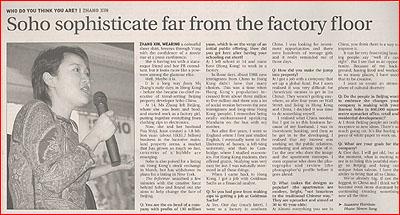 ZHANG
XIN, WEARING a colourful sheer shirt, breezes through Vong with the confidence
of a movie star at a press conference.
ZHANG
XIN, WEARING a colourful sheer shirt, breezes through Vong with the confidence
of a movie star at a press conference.
She is having tea with a statuesque friend and her PR consultant, but it looks more like a powwow among the glamour elite.
Well. Maybe it is.
It is a long way from Ms Zhang's early days in Hong Kong before she became co-chief executive of trend-setting Beijing property developer Soho China.
At 14,Ms Zhang left Beijing, where she was born and bred, and started work as a factory girl, putting together everything from clothing zips to electronics.
Now, she and her husband Pan Shiyi, have created a 1.8 billion Yuan (about HK$1.7 billion) business in the lucrative mainland property arena, a market that has grown so much so fast, concerns of a bubble are emerging.
Soho is also poised for a listing on Hong Kong's stock exchange in March, but has withdrawn its plans for a listing in New York.
The Informer snatched a few minutes with the creative force behind Soho and found out she aims to help change the face of Beijing.
Q: You are the co-head of a company with profits of 130 million Yuan, which is on the verge of an initial public offering. How did you get here after having your schooling cut short?
A: I left school at 14 and came here (Hong Kong) to work in a factory.
In those days, about 1980,new immigrants from China to Hong Kong didn't have that many choices. This was a time when Hong Kong's population increased from about three million to five million and there was a lot of social tension between the new immigrants and long-time Hong Kong (people). I remember being really embarrassed speaking Mandarin on the bus with my mother.
But after five years, I went to England where I first just studied English. I eventually went to the University of Sussex, a left-wing university, and then to Cambridge, where I studied economics. For Hong Kong students, they offered grants.Studying was very easy for me. I was naturally interested in all these things.
When I came back to Hong Kong, I got a job with Goldman Sachs as a financial analyst.
Q: So you had gone from making zips to getting a job at Goldman Sachs?
A: Yes. One day (much later), I went to a factory in southern China. I was looking for investment opportunities and there were hundreds of teenage girls and it really reminded me of those days.
Q: How did you make the jump into property?
A: I got a job with a company that set up a global fund. But I soon realised it was very difficult for (American) monies to get in (to China). They weren't getting anywhere, so after four years on Wall Street and living in Hong Kong and China, I decided it was time to do something myself.
I realised what China needed. But I got in to this business because of my husband .I was in investment banking, and then as he got in to the developing, I realised that my interest was working on the public relations, marketing and artistic side of it. I'm the one who does the image and the apartment concepts. I even organize who does the photographs and review (the photographer's) profile before it goes ahead.
Q: What makes the designs so popular? (The apartments are modern, bright," not luxurious in the traditional Chinese way." They are upmarket and aimed at 30 to 45-year-olds)
A: Almost everything you see in China, you think there is a way to improve it.
It can be very frustrating hearing people say "well it's not right". But I see that as an opportunity. Because of my background, having lived and worked in so many places, I have used that to be creative.
I want to create an atmosphere of cultural diversity.
Q: Do the people in Beijing want to embrace the changes your company is making with your Jianwai Soho (a 690,000 square metre upmarket office, retail and residential development)?
A:I think Beijing people are really receptive to new ideas. There's
so much going on. It's like having a piece of white paper to work on.
Q: What are your goals for the company?
A: One day, I will get old, but at the moment, what is exciting to me is to bring this youthful energy to Beijing and bring out unique Asian talents. I have the ability to bring that all to China.
We're already big, if not the biggest, in China and I think we'll become even
more dominant by continuing creating something new all the time.





